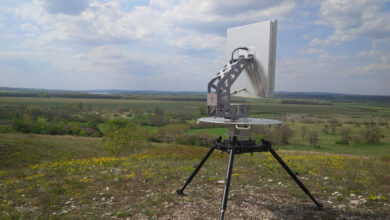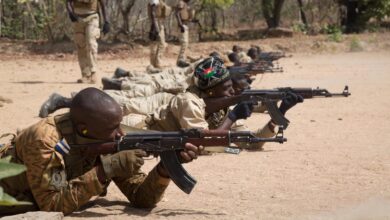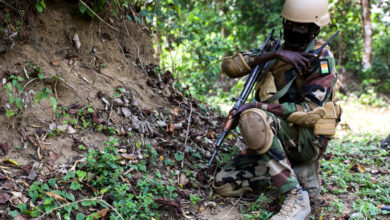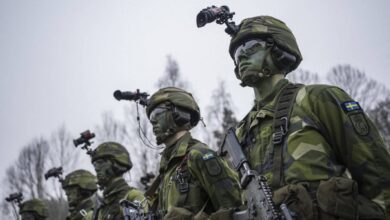Chad’s defense minister discussed plans to deploy a battalion of military personnel to the Mali-Burkina Faso-Niger tri-border area with his French and Swedish counterparts on Monday, January 20, according to reports.
France’s Minister of the Armed Forces Florence Parly arrived in Chad’s capital N’Djamena on Sunday to begin a two-day visit to the Sahel region accompanied by Sweden’s Minister for Defence, Peter Hultqvist, the French ministry said in a statement.
The European delegation met Chad’s defense and foreign affairs ministers, along with presidency and cabinet officials, al-Wihda reported. The French ministry said they were to be accompanied by Major General Pascal Facon, who commands the French-led Operation Barkhane counterterrorism force headquartered in N’Djamena.
“The meeting provided an opportunity to discuss technical and legal details as well as preconditions for the deployment of Chadian troops in the Tri-border area,” al-Wihda reported Chad’s Minister of National Defence General Mahamat Abali Salah as saying.
Parly announced that Chad’s President Idriss Déby Itno had instructed the armed forces to send a battalion to the tri-border zone, according to Tchad Infos.
The meeting came a week after a summit in Pau in southwestern France, where President Emmanuel Macron and the leaders of the G5 Sahel states announced a new Coalition for the Sahel which will see increased coordination between French and local forces focused on the tri-border zone and targeting Islamic State as a priority.
On Thursday, the French defense ministry said that Barkhane forces had conducted a “large-scale joint operation with our partners in the G5 Sahel” in the tri-border area since January 2.
“The Pau summit helped to breathe new life into the action taken by France and the G5 countries in the Sahelo-Saharan strip,” the French ministry’s Sunday statement said. “A week later, the time has come to implement the Sahel Coalition.”
The new Coalition will see forces deployed to Barkhane and the G5 Sahel Joint Force (FCG5S) – which comprises troops from Chad, Mali, Niger, Burkina Faso and Mauritania – operating under joint command. Macron also announced that 220 more troops would sent to the Sahel to reinforce Operation Barkhane.
The FCG5S has three zones of operation: the western Mali-Mauritania border; the central border region between Burkina Faso, Mali and Niger; and the eastern Niger-Chad frontier.
According to a March 2018 NATO report, at full operational capacity the FCG5S force aims to maintain seven battalions – two from both Mali and Niger and one each from Burkina Faso, Chad and Mauritania. Each battalion consists of 550 soldiers plus 100 police or gendarmes, for a total of 4,550.
The Joint Force is currently limited to a strip 50 km (30 miles) wide on both sides of each border zone, but the Pau declaration said the FCG5S “concept of operation will be revised,” allowing it “greater room for maneuver.”
It is unclear whether the Chadian plans include a second battalion for the FCG5S. In January, 1,200 Chadian troops were withdrawn from Nigeria where they deployed as part of the regional Multinational Joint Task Force battling Boko Haram in the Lake Chad area.
Portuguese and Estonian officials join French and Swedish ministers in Mali
Portugal’s Minister of National Defense Joäo Gomes Cravinho and Estonia’s Permanent Secretary of the Ministry of Defence Kristjan Prikk joined Parly and Hultqvist for the second leg of the trip in Mali’s capital Bamako, the French ministry said in a Monday statement.
The four ministers were to meet with Mali’s Minister of Defense and Veterans Affairs Major General Ibrahim Dahirou Dembélé, the Special Representative of the United Nations Secretary General in Mali and Head of MINUSMA Mahamat Saleh Annadif, G5 Sahel Joint Force commander Nigerien General Oumarou Namata, and President Ibrahim Boubacar Keita.
The day will continue with a meeting with representatives of the European Union’s missions, followed by dinner at the French Embassy.
Portugal’s Brigadier General João Boga Ribeiro currently leads the European Union Training Mission in Mali and Sweden’s Lieutenant General Dennis Gyllensporre serves as MINUSMA Force Commander.
The complex insurgency in the Sahel began in Mali in 2012, when a Tuareg separatist uprising was exploited by Islamist extremists linked to al-Qaeda who took key cities in the desert north. Former colonial power France began its current military intervention in the Sahel region the following year, with Operation Serval driving the jihadists from the towns.
But the militant groups have morphed into more nimble formations operating in rural areas, and the insurgency has gradually spread to central and southern regions of Mali and across the borders into neighboring Burkina Faso and Niger.
According to the U.N, around 4,000 people were killed in militant attacks in the three Sahel countries last year.
Serval evolved in August 2014 into Operation Barkhane, with a mandate for counter-terrorism operations across the sub-Saharan region. Roughly 4,500 French troops are already deployed, focusing activity in insurgent-hit Mali, Niger and Burkina Faso.
Troops deployed to Barkhane work alongside other international operations in the Sahel, including the regional G5 Sahel Joint Force and MINUSMA, the U.N. stabilization mission in Mali.
Many armed groups including Islamic State are active in the Sahel region, but the majority of attacks are attributed to JNIM, which formed in March 2017 from a merger of several smaller groups. JNIM’s leadership has pledged allegiance to al-Qaeda leader Ayman al-Zawahiri.
Macron said the Sahel Coalition would prioritize the fight against ISIS in the Mali-Burkina Faso-Niger tri-border area because it is the most dangerous.
ISIS previously attributed attacks by affiliated militants in the Sahel to Islamic State in the Greater Sahara, but since May 2019, ISIS has attributed insurgent activities in the tri-border area to ISWAP, its West Africa Province affiliate that split from Boko Haram in 2016. ISWAP’s main area of operations is the Lake Chad area of Nigeria, Niger, Chad and Cameroon.
Barkhane has a growing international dimension, with France’s European partners contributing troops and equipment. Denmark deployed two Merlin helicopters that became operational in late December and Estonia is to almost double the size of its Barkhane contingent this year. Chinook helicopters from the United Kingdom also support the operation.
France has for months been trying to build support for a new international task force called “Takuba.” In November, Parly said that France expected the new force to deploy in Mali by 2020.
Estonia was the first partner to confirm a special operations forces deployment to Takuba. A defense ministry spokesperson told The Defense Post in November that special forces will deploy to Mali in the second half of 2020 and that force will “assist, advise and accompany” the Malian Armed Forces. Belgium and the Czech Republic have also signaled that they will participate, but the U.S. and Germany have declined.










